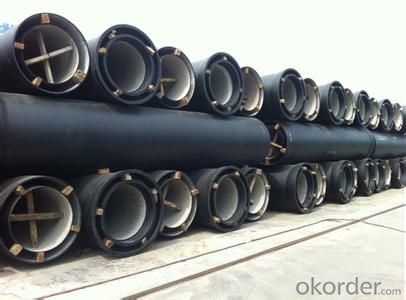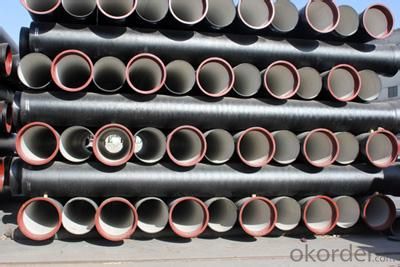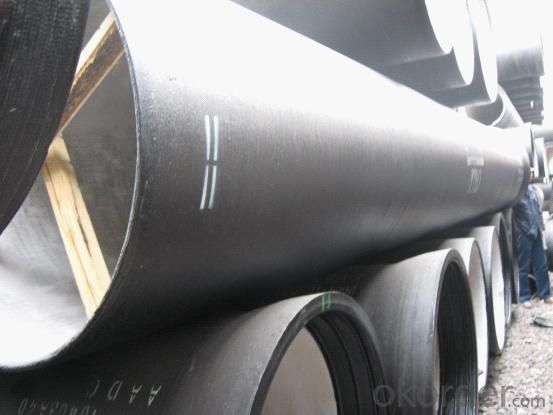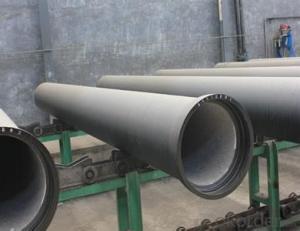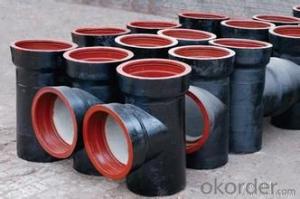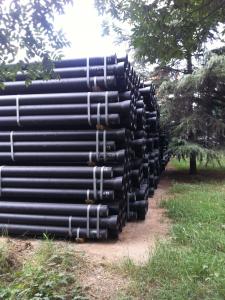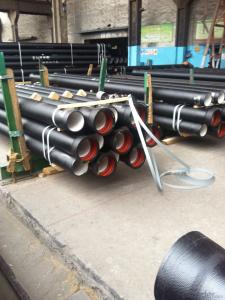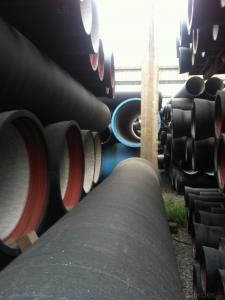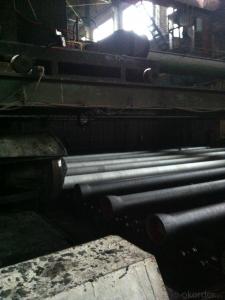DUCTILE IRON PIPE AND PIPE FITTINGS K7 CLASS DN200
- Loading Port:
- Tianjin
- Payment Terms:
- TT or LC
- Min Order Qty:
- 23 m.t.
- Supply Capability:
- 3000 m.t./month
OKorder Service Pledge
OKorder Financial Service
You Might Also Like
Product Discription:
OKorder is offering high quality K7 CLASS DN200 Ductile Iron Pipe and Pipe Fittings at great prices with worldwide shipping. Our Pipe and Pipe Fittings are available in a wide range of styles and materials, and are guaranteed with a full warranty. Our supplier is a world-class manufacturer of Ductile Iron, and our products are utilized the world over, with OKorder annually supplying a full range of products to European, North American and Asian markets. We provide quotations within 24 hours of receiving an inquiry and guarantee a competitive price.
Product Applications:
Our K7 CLASS DN200 Ductile Iron Pipe and Pipe Fittings are incredibly reliable and ideal for potable water transmission and distribution as well as utility projects (water and sewer).
Product Advantages:
OKorder's K7 CLASS DN200 Ductile Iron Pipe and Pipe Fittings are of the highest quality and we offer external coatings and internal linings as well as accessories such as SBR/EPDM rubber gaskets, lubricant paste, pipe caps, PE sleeves, etc. We include a copy of the original inspection reports upon shipment, photos of the loading process sent to the customer, and delivery progress weekly updates
Main Product Features:
· Strict inspections according to related standards
· Easy installation and service-free
· Extended service lifespan
Product Specifications:
Material: Ductile Cast Iron
Sizes: DN 80mm – DN 2000mm
Effective Length: 6m – 5.7m
Standards: ISO 2531:1998 / EN 545:2006 / EN 598:2007
Annual Capacity: 200,000 tons
Coating: Zinc 130g/m² (ISO 8179-1); 70 micron bitumen coating
Cement: Portland Cement / High Alumina Cement / Sulphate Resisting Cement Lining (ISO 4179)
FAQ:
Q1: Why buy Materials & Equipment from OKorder.com?
A1: All products offered by OKorder.com are carefully selected from China's most reliable manufacturing enterprises. Through its ISO certifications, OKorder.com adheres to the highest standards and a commitment to supply chain safety and customer satisfaction.
Q2: How do we guarantee the quality of our products?
A2: We have established an advanced quality management system which conducts strict quality tests at every step, from raw materials to the final product. At the same time, we provide extensive follow-up service assurances as required.
Q3: What is the difference between Cast Iron and Ductile Iron?
A3: Cast iron is a generic name for any high carbon molten iron poured as a casting. When used to refer to pipe, cast iron (sometimes called gray iron) is a specific type in which the free graphite (Carbon) is in the shape of flakes. Ductile Iron is a specific type of cast iron in which the free graphite is in the shape of nodules or spheroids. Although nearly identical chemically, the two irons are quite different metallurgically. The current standard for Ductile Iron Pipe (ANSI / AWWA A21.51 / C151) requires a minimum grade of 60-42-10 (60,000psi Ultimate Tensile Strength, 42,000psi Yield Strength, and 10% Elongation). Although Cast Iron was the best engineering material available for pipe production for nearly five hundred years, the development of Ductile Iron Pipe provides a far superior product.
Q4: How much thermal expansion should I allow for?
A4: The linear expansion of ductile iron pipe as a result of thermal effects is very small, with ductile iron expanding less than concrete. For rubber gasketed joints and mechanical joints assembled in accordance with the manufacturer’s instructions, there is enough clearance from the face of the plain end of the pipe to the back of the bell to account for significant thermal growth before beginning to make metal-to-metal contact. Except for very long runs of exposed piping, particularly if flow is intermittent, thermal expansion is usually not a concern.
Q5: What is the maximum velocity recommended for cement-lined Ductile Iron pipe?
A5: Although there are differing opinions on this subject, a conservative maximum velocity for design purposes is 7 fps (feet per second). Ductile Iron pipe may be rated as high as 350 psi service. A pipeline operating at 7 fps velocity could account for a 350 psi pressure surge (7fps X 50 psi/fps). Adding a potential surge pressure equal to the pressure rating of the pipe encroaches significantly on the safety factor. Exceeding 7 fps velocity could produce potentially damaging surge pressure.
Q6: Can cement-mortar linings be repaired in the field?
A6: Repair is achieved by first cutting out the defective or damaged lining to the metal so that the edges of the lining not removed are reasonably perpendicular to the pipe wall or slightly undercut. A stiff mortar is then prepared and applied to the cutout area and troweled smooth with adjoining lining. To provide for proper curing of patches by preventing too rapid of a moisture loss from the mortar, the patched area is normally seal-coated immediately after any surface water evaporates, or alternatively the area is kept moist (e.g. with wet rags or burlap over the area or with the ends of the pipe or fitting taped over with plastic film, etc.). Of course, in potable water-related applications, no patch or curing components should be used in the repair that would negatively affect health or water quality.
- Q: Are ductile iron pipes suitable for use in irrigation canals?
- Yes, ductile iron pipes are suitable for use in irrigation canals. Ductile iron pipes are known for their strength and durability, making them an excellent choice for carrying water in irrigation systems. They have high tensile strength and can withstand the heavy loads and pressures typically encountered in irrigation canals. Additionally, ductile iron pipes have excellent corrosion resistance, making them ideal for use in environments where water quality may vary. They are also resistant to UV rays and can withstand extreme weather conditions, which is crucial for their longevity in an irrigation canal system. Furthermore, ductile iron pipes have the ability to handle high flow rates and can efficiently transport water over long distances, ensuring effective irrigation. Overall, ductile iron pipes offer numerous benefits and are a reliable and suitable choice for use in irrigation canals.
- Q: Can ductile iron pipes be used for irrigation systems in saline soil conditions?
- Yes, ductile iron pipes can be used for irrigation systems in saline soil conditions. Ductile iron pipes are known for their durability and corrosion resistance, making them suitable for various soil conditions, including saline soil. Saline soil contains high levels of salt, which can cause corrosion and deterioration of certain materials. However, ductile iron pipes have a protective coating, such as cement mortar lining or polyethylene encasement, which provides an additional layer of protection against corrosion. This ensures that the pipes can withstand the corrosive effects of saline soil and maintain their structural integrity over a long period of time. Additionally, ductile iron pipes have a high tensile strength, making them resistant to cracks and breaks, which is important for irrigation systems that require a continuous and reliable water supply. Therefore, ductile iron pipes are a suitable choice for irrigation systems in saline soil conditions.
- Q: How do ductile iron pipes handle heavy traffic loads?
- Ductile iron pipes are extremely durable and can handle heavy traffic loads with ease. This is due to their exceptional strength and flexibility. The composition of ductile iron, which includes graphite nodules, allows the material to be more flexible than traditional cast iron pipes. This flexibility enables the pipes to withstand heavy traffic loads, including the weight of vehicles passing over them. Additionally, ductile iron pipes have a high load-bearing capacity, which means they can support substantial weights without experiencing deformation or structural failure. This makes them suitable for use in areas with heavy traffic, such as highways, bridges, and industrial sites. Furthermore, ductile iron pipes have excellent resistance to external forces, such as vibrations and impacts. They can absorb and distribute these forces throughout the pipe network, preventing damage and maintaining structural integrity. In summary, ductile iron pipes are specifically designed to handle heavy traffic loads. Their strength, flexibility, and load-bearing capacity make them a reliable choice for infrastructure projects where durability and longevity are essential.
- Q: Can ductile iron pipes be used for oil and gas pipelines?
- Yes, ductile iron pipes can be used for oil and gas pipelines. Ductile iron is known for its durability, strength, and corrosion resistance, making it suitable for transporting oil and gas. Its high tensile strength and ability to withstand pressure and extreme temperatures make it a reliable choice for these applications.
- Q: What are the different corrosion protection options for ductile iron pipe?
- There are several corrosion protection options available for ductile iron pipes. These include internal linings such as cement mortar or polyethylene encasement, external coatings like zinc or polyethylene, and cathodic protection systems. Each option offers varying levels of protection and is chosen based on the specific needs and conditions of the pipe installation.
- Q: How can the cast iron pipe be connected?
- Cast iron pipes are flanged and socket connected
- Q: What is the expected joint deflection of ductile iron pipes?
- Various factors, such as the pipe diameter, joint type, and installation conditions, influence the expected joint deflection of ductile iron pipes. Generally, ductile iron pipes are designed to allow for some deflection at the joints to accommodate flexibility and movement. The American Water Works Association (AWWA) offers guidelines for the maximum allowable joint deflection of ductile iron pipes. According to AWWA C151/A21.51, the joint deflection should typically not exceed 3 degrees or 1% of the nominal pipe diameter, whichever is greater. It is crucial to ensure that the joint deflection remains within the specified limits to maintain the structural integrity and performance of the pipeline system. Excessive joint deflection can result in leaks, failures, and reduced pipe lifespan. To accurately determine the expected joint deflection for a specific installation, it is recommended to refer to the manufacturer's specifications and guidelines. These specifications may vary based on pipe size, joint type, and other factors. Seeking guidance from a qualified engineer or directly contacting the manufacturer can provide precise information tailored to the project requirements.
- Q: Can ductile iron pipes be used for underground hydropower systems?
- Yes, ductile iron pipes can be used for underground hydropower systems. Ductile iron pipes are known for their strength and durability, making them suitable for various applications, including underground installations. They have excellent resistance to corrosion and can withstand high pressure, making them ideal for carrying water in hydropower systems. Ductile iron pipes also have a long lifespan, reducing the need for frequent replacements and minimizing maintenance costs. Additionally, they have good joint integrity, ensuring leak-free connections underground. Therefore, ductile iron pipes are a reliable choice for underground hydropower systems.
- Q: Can ductile iron pipes be used for underground river crossings?
- Underground river crossings can indeed utilize ductile iron pipes. Renowned for their robustness and longevity, ductile iron pipes are highly versatile, making them ideal for a range of applications, including underground river crossings. These pipes possess exceptional tensile strength, enabling them to withstand the external forces and pressures imposed by the surrounding soil and water. Moreover, their outstanding resistance to corrosion is paramount when dealing with subterranean water sources like rivers. Additionally, ductile iron pipes can endure ground movements, settling, and any geological obstacles that may arise during the installation and operation of underground river crossings. Consequently, they represent a dependable choice, ensuring the secure and efficient conveyance of water across rivers while preserving the integrity of the subterranean infrastructure.
- Q: How do ductile iron pipes handle pipe deflection?
- Ductile iron pipes have high flexibility and strength, allowing them to handle pipe deflection effectively. They can withstand moderate deflection without causing significant damage or compromising their structural integrity. This flexibility is due to the ductile nature of the iron used in their construction, which allows them to bend and adapt to changes in the ground or surrounding environment. Overall, ductile iron pipes are well-suited for handling pipe deflection situations.
Send your message to us
DUCTILE IRON PIPE AND PIPE FITTINGS K7 CLASS DN200
- Loading Port:
- Tianjin
- Payment Terms:
- TT or LC
- Min Order Qty:
- 23 m.t.
- Supply Capability:
- 3000 m.t./month
OKorder Service Pledge
OKorder Financial Service
Similar products
Hot products
Hot Searches
Related keywords




